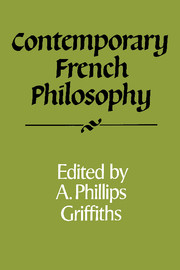Book contents
- Frontmatter
- Contents
- Preface
- Continental Insularity: Contemporary French Analytical Philosophy
- The Misprision of Pragmatics: Conceptions of Language in Contemporary French Philosophy
- Ants and Women, or Philosophy without Borders
- Motifs towards a Poetics
- The Relevance of Cartesianism
- The Enlightenment without the Critique: A Word on Michel Serres' Philosophy
- The Teleological and Deontological Structures of Action: Aristotle and/or Kant?
- The Crisis of the Post-modern Image
- Merleau-Ponty and the Phenomenology of Perception
- Epistemological History: The Legacy of Bachelard and Canguilhem
- History as Genealogy: An Exploration of Foucault's Approach to History
- Beyond Deconstruction?
- Further Adventures of the Dialectic: Merleau-Ponty, Sartre, Althusser
- Paradoxes of the Pineal: From Descartes to Georges Bataille
- Notes on Contributors
- Index
Merleau-Ponty and the Phenomenology of Perception
Published online by Cambridge University Press: 25 May 2010
- Frontmatter
- Contents
- Preface
- Continental Insularity: Contemporary French Analytical Philosophy
- The Misprision of Pragmatics: Conceptions of Language in Contemporary French Philosophy
- Ants and Women, or Philosophy without Borders
- Motifs towards a Poetics
- The Relevance of Cartesianism
- The Enlightenment without the Critique: A Word on Michel Serres' Philosophy
- The Teleological and Deontological Structures of Action: Aristotle and/or Kant?
- The Crisis of the Post-modern Image
- Merleau-Ponty and the Phenomenology of Perception
- Epistemological History: The Legacy of Bachelard and Canguilhem
- History as Genealogy: An Exploration of Foucault's Approach to History
- Beyond Deconstruction?
- Further Adventures of the Dialectic: Merleau-Ponty, Sartre, Althusser
- Paradoxes of the Pineal: From Descartes to Georges Bataille
- Notes on Contributors
- Index
Summary
It is over forty years since Merleau-Ponty published his first major work, Le structure de comportement (‘The Structure of Behaviour’) (1942) and a quarter of a century since he died. He belongs, therefore, with Sartre and Marcel, to the first post-War generation of French philosophers. Like his friend Sartre's, his philosophy may be regarded as dated, passé, of no interest or relevance to truly contemporary thought. In philosophical terms forty years are nothing; in terms of trends, fashions and novelties they are an eternity. But perhaps the work of Merleau-Ponty has not dated because it was never in vogue. He did not write plays and novels, or take part in political demonstrations, though he was involved in politics, or win a Nobel prize and refuse to receive it. He was very much a philosopher's philosopher, eminent in his field, well known in academic circles in France but hardly a household name. In this country he is hardly known even in philosophical circles, except by name. More is the pity, since his philosophical approach and manner of philosophizing have much in common with certain modes of British philosophizing, as I hope to show.
Merleau-Ponty was born at Rochefort-sur-Mer in 1908. He studied with Sartre at the Ecole Normale. Having taught in a lycée for five years, he joined the Ecole Normale as agrégé répetiteur in 1930. He joined the army in 1939.
- Type
- Chapter
- Information
- Contemporary French Philosophy , pp. 123 - 140Publisher: Cambridge University PressPrint publication year: 1989



